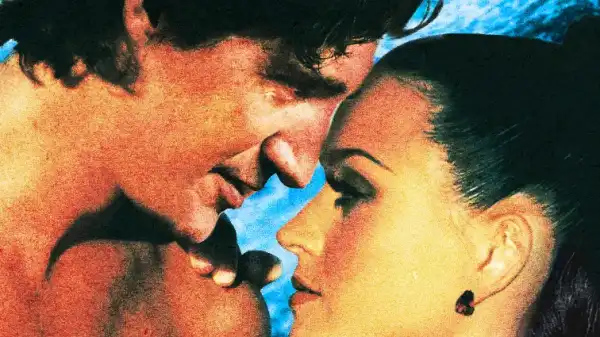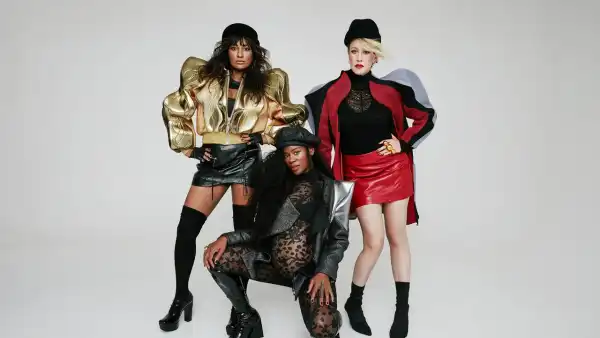
Save this storySave this storySave this storySave this story
Hollywood came to a standstill for much of 2023, when its writers and actors hit the picket line simultaneously for the first time in more than sixty years. Arriving in the wake of the pandemic—which made television more central to daily life even as it impeded its production—the strikes had an instantaneous and sustained impact. Late-night shows went dark, the broadcast networks’ fall season fell through, and the Peak TV era came to an unceremonious end. Both unions have convincingly declared victory, but, after years of reliance on boom-time profligacy, the industry is bracing for a downturn in the quantity—and perhaps the quality—of its output.
The cloud of that uncertainty hangs over the end of this year in television. Certain factions have already adopted a doomer mind-set; in the past few weeks, multiple people have asked me whether the business will revert to risk aversion. (I hope not!) But before we look ahead to TV’s next chapter, it’s worth celebrating the highlights of the previous twelve months. Given the studio stoppages, there were fewer contenders than usual. But 2023’s best offerings are strong enough that the following Top Ten list, arranged in alphabetical order, could rival any other year’s.
“Barry” (HBO/Max)
“Barry” renounced its comedic roots halfway through its four-season run, after Bill Hader’s titular assassin turned actor is found out as a killer by his beloved mentor and can no longer indulge in fantasies about a show-biz career. In abandoning its original premise, the show—now a dramatic thriller punctuated by scenes of droll absurdism—became far truer to its characters and their inescapable existential dread. Hader, who took over as showrunner and directed every episode of the final season, honored the series’ defining themes while steering the characters to their inevitable destinations, as when an eight-year time jump transformed the hit man from inmate to fugitive to unlikely bio-pic subject. Despite the shift in genre, “Barry” continued to deliver inventive action sequences and go-for-broke monologues (especially from the perpetually overlooked Sarah Goldberg), all while maintaining one of television’s trickiest tonal balancing acts. Forget stardom; here, an auteur is born.

Photograph by Andrew Cooper / Courtesy Netflix
“Beef” (Netflix)
A road-rage incident gives way to a mutual chase between two self-loathing rageaholics (Steven Yeun and Ali Wong) who uncork something ferocious in each other—and anchor the most sharply observed series on this list. Riotously funny and seldom predictable in its plotting, the dramedy is also a showcase of outrageously good performances, not only from Yeun and Wong but from an ensemble that includes veterans (Patti Yasutake) and newcomers (Young Mazino) alike. The show, which explores the intergenerational traumas and the mental-health struggles of its dual protagonists, may well herald new paths forward for cultural specificity onscreen.
“The Curse” (Showtime/Paramount+)
After years of nudging the subjects of his docu-comedies into cringe-inducing situations, Nathan Fielder casts himself as a victim of reality TV in the heady and disorienting scripted series he created with Benny Safdie. In “The Curse,” Fielder and Emma Stone play a couple seeking HGTV stardom whose marriage starts to fall apart during filming—partly because of the serpentine influence of their producer (Safdie), partly because subjecting any relationship to the scrutiny of cameras invites doubts. An anxiety-inducing character study that grapples with the performativity of both domestic bliss and enlightened whiteness, the show is most successful as an exploration of the cracks that can grow into fissures when two people can’t see each other clearly. In his first wholly fictional outing, Fielder continues to do what he apparently enjoys most: fucking with viewers’ sense of reality.

Photograph by Niko Tavernise / Courtesy Amazon Prime
“Dead Ringers” (Amazon Prime)
It’s rare for reboots, remakes, sequels, or prequels to make best-of-year lists. But the playwright and screenwriter Alice Birch turned a project seemingly no one asked for—a gender-flipped update of “Dead Ringers,” the 1988 David Cronenberg movie about twin gynecologists played by Jeremy Irons—into a spiky, atmospheric, delightfully creepy thriller with Rachel Weisz in the central roles. Cronenberg’s film was about two men who couldn’t connect with women despite their expertise in female anatomy; Birch’s transposition allows her to meditate on how women’s bodies are often where medicine strives to bend natural laws, and the way such cutting-edge treatments are reserved for those who can afford them. In other words, the miniseries is a thorough and timely reimagining of the source material, and Weisz delivers one—two?—of the most riveting performances of the year.
“Fellow Travelers” (Showtime/Paramount+)
History is an oppressive force in “Fellow Travelers,” but, miraculously, the eight-part adaptation of Thomas Mallon’s novel seldom gets bogged down in tragedy. Sensual and heartfelt, the show traces the thirty-odd-year relationship between two men (Matt Bomer and Jonathan Bailey) who first meet each other in the fifties during Joseph McCarthy’s Lavender Scare, when the far-right senator sought to purge not just Communists but gay men and women from government service. “Fellow Travelers” dramatizes the moral compromises and ugly choices enforced by the closet at a time when queer solidarity was tenuous at best. Bailey, in particular, lends a winsome unpredictability to the period romance, which is less interested in didacticism than in exploring how these characters respond to the historical circumstances—and, gradually, social progress—that arrive just in time for some, and much too late for others.

Photograph by Shane Brown / Courtesy FX
“Reservation Dogs” (FX/Hulu)
The third and final season of “Reservation Dogs” began with Oklahoma native Bear getting lost on the way home from California. The remaining episodes had a meandering quality, too, trying on different protagonists, perspectives, moods, time lines, and realities. It made for an ambitious, if less conventionally satisfying, swan song for the acclaimed Native American dramedy, which saw its teen-age quartet graduate into new roles in the community. Along the way, the show lent the coming-of-age narrative new cultural weight and even cosmic significance—a reframing that feels both risky and visionary.
“Scavengers Reign” (Max)
Back when science fiction was still a genre proverbially shoved into lockers, many defenders cited its relevance—and resemblance—to our own world as a reason to take it seriously. Personally, I’ve often wondered why sci-fi isn’t more interested in conjuring creatures for which we have no earthly frame of reference. The richly original “Scavengers Reign,” which began as an Adult Swim short, is a triumph of imagination, using animation to bring wondrously unfamiliar flora and fauna to life. Many are impersonally hostile, some can be put to practical use, and still others simply beguiling to the human crew members of a transport vessel who’ve been stranded on a distant planet and must understand their new ecosystem in order to survive. Brutal and melancholy, with sparse dialogue for roughly the first half of its twelve chapters, “Scavengers Reign” is the kind of show that forces viewers to acclimate themselves to its unrushed rhythms. It doesn’t take long before the hypnosis sets in.

Photograph courtesy HBO Max
“Somebody Somewhere” (HBO/Max)
The vibes are immaculate in the Bridget Everett vehicle “Somebody Somewhere,” TV’s loveliest hangout dramedy. Everett’s bawdy, snarky Sam would make a face at anyone who called her small-town Kansas adventures with her gay best friend, Joel (Jeff Hiller), “lovely,” but there’s no denying that the pleasures here are soft and bright. After the first season showed Sam that there was a place for her in her home town, especially within its queer community, the second saw her confronted with the consequences of living life as a clenched fist. Her tensions with Joel, who worships Sam but fears that her closed-off affect and codependency could limit his own chances at finding love, are thoroughly believable, rooted as they are in both characters’ pangs about their unfulfilled potential in middle age. Like a homemade biscuit, a modest, low-stakes series of this type has few ingredients, and mixing them in the wrong proportions could yield a mess. “Somebody Somewhere” gets the recipe just right—and couldn’t be more comforting.
“Stolen Youth: Inside the Cult at Sarah Lawrence” (Hulu)
By the time most subjects of cult documentaries get in front of a camera, they’ve already undergone the conversion from true believer to clear-headed heretic. “Stolen Youth” is distinguished by its intensely intimate footage of one victim, Felicia Rosario, gradually deprogramming herself, sorting her real memories from the false ones implanted by an abusive ex-partner, Larry Ray. Ray ultimately recruited and brainwashed half a dozen students from Sarah Lawrence College during his time living with his daughter, Talia, on campus, including her best friend and her boyfriend. His misdeeds made headlines in 2019, but this sensitive docuseries is far from the hyper-topical cash-grabs that litter the TV landscape; rather, it’s a rare entry in the true-crime genre that foregrounds the pain and resilience of victims.

Photograph by Graeme Hunter / Courtesy HBO Max
“Succession” (HBO/Max)
2023 was a banner year for even casual observers of the Murdoch family, with patriarch Rupert finally settling into semi-retirement and the Dominion lawsuit offering up sundry surprises about the inner workings of Fox News. In a testament to its brilliance, “Succession” paid off as both a mirror of the Murdochs’ political influence and a chronicle of the Roys’ particular dynastic dysfunctions, enacted by arguably the best cast on television. The final season first bid adieu to paterfamilias Logan, whose abrupt death left a crater at the center of his family. Funnier than most comedies and more stressful than many horror films, “Succession” gave us enough indelible moments—Roman collapsing in tears before he can finish a eulogy at his father’s funeral, Shiv weaponizing her pregnancy against her estranged husband Tom, second son Kendall insisting that he deserves the throne because he’s “the eldest boy”—to fill a ludicrously capacious bag.
Honorable Mentions: “This Fool” (Hulu) and “The Other Two” (Max)—two comedies with bleak, biting sensibilities—probably made me laugh harder than any other shows this year. The zombie-travelogue drama “The Last of Us” (HBO/Max) bucked the trend of bad video-game adaptations by virtue of its thoughtful post-apocalyptic world-building and the macabre beauty of its mushroom monsters. The sports documentarian Greg Whiteley (“Cheer,” “Last Chance U”) delivered another deeply humanist study of athletics, mentorship, and economic precarity in “Wrestlers” (Netflix), about an independent wrestling league struggling for survival. “Shiny Happy People” (Amazon Prime) may be 2023’s most jaw-dropping docuseries for its behind-the-scenes look at the repulsiveness of the Duggar family reality-TV phenomenon. “Dear Mama” (FX/Hulu) provided a diptych portrait of Afeni, a talented but troubled former Black Panther, and Tupac Shakur, her world-famous rapper son; the director Allen Hughes endowed the series with exceptional visual energy as he traced the hip-hop star’s efforts, successful and otherwise, to translate the political lessons that he learned from his mother into enduring hits. ♦
Sourse: newyorker.com







